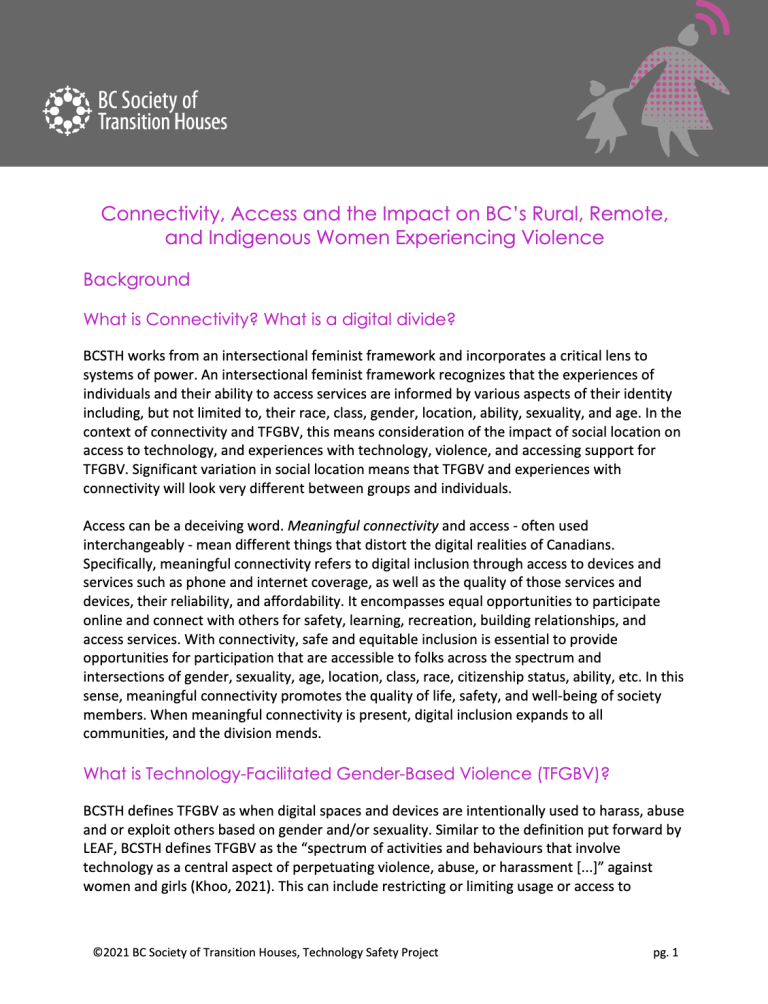16 search results
For BCSTH, NGOs, anti-violence organizations, member programs
Lack of meaningful connectivity negatively impacts both service providers and service users.
Recommendation 11: Organizations can promote anti-violence worker’s wellbeing and prevent burnout (which could impact service delivery) by developing occupational health and wellbeing policies that reflect new delivery methods and contexts such as those that utilize more technology, including remote service delivery or work from home situations.-
Category and theme:
Audience:
For BCSTH, NGOs, anti-violence organizations, member programs
Lack of meaningful connectivity negatively impacts both service providers and service users.
Recommendation 12: Agencies can advocate for funders to pay for internet for anti-violence workers.-
Category and theme:
Audience:
For BCSTH, governments, schools, NGOs, anti-violence organizations
Unique contexts specific to RRI communities result in a different significance of meaningful connectivity, as well as distinct challenges, for women in these communities.
Recommendation 13: Incorporate information about online misogyny into technology literacy resources for youth to account for unsafe online spaces and support them in safely navigating the internet.-
Category and theme:
Audience:
For BCSTH, antiviolence organizations, NGOs
Unique contexts specific to RRI communities result in a different significance of meaningful connectivity, as well as distinct challenges, for women in these communities.
Recommendation 14: Develop online dating safety resources for RRI women as components of tech literacy for both service users and providers, in ways easily accessible to tech literacy “beginners” and adult women.-
Category and theme:
Audience:
For private sector, government, NGOs, BCSTH
Unique contexts specific to RRI communities result in a different significance of meaningful connectivity, as well as distinct challenges, for women in these communities.
Recommendation 15: Policy work moving forward should prioritize connectivity as a safety necessity for anti-violence work and emergency preparedness. This involves actions such as:- Ensuring that emergency alerts can reach all Canadians, especially those in areas that are increasingly impacted by climate change-aggravated disasters (infrastructure issues)
- Organizing collaborative emergency planning with participation from a variety of sectors including, for instance, the private sector – particularly companies with access to connectivity technology and infrastructure – and anti-violence organizations. As pointed out by the report, this planning should be informed by and reflect Indigenous land knowledge and practices.
- Researching and investing in sustainable and ecologically wise connectivity infrastructure that is resilient to climate change to ensure the maximum possible protection of community members’ wellbeing, especially those most vulnerable to post-crisis violence.
- Researching and developing a plan for women who need to call emergency services for experiences of violence but have no phone or internet as a result of the disaster
-
Category and theme:
Audience:
For BCSTH, anti-violence organizations, government
Unique contexts specific to RRI communities result in a different significance of meaningful connectivity, as well as distinct challenges, for women in these communities.
Recommendation 16: Incorporate disaster and emergency planning in anti-violence programs’ policies.-
Category and theme:
Audience:
